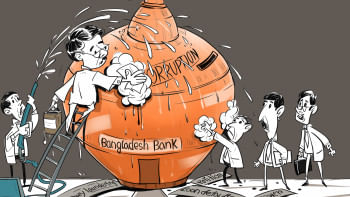Can we change the story of our ailing banks?

The extent of damage done to the banking sector during Awami League's 15 years of rule is truly shocking. Despite this daily's frequent coverage of various irregularities during its tenure, and more transparency emerging in the wake of the mass uprising that brought down Sheikh Hasina, the true scale of corruption in the banking sector seems unfathomable, with new revelations coming to the fore every day. This just shows how daunting the challenge will be for the interim government as it sets its sights on reforms and recovery. Nevertheless, it must perform its duties diligently.
The new administration has already taken some positive steps in this regard. The decisions to form a banking commission to undertake reforms and a task force to identify key areas of concern are notable. According to a report by this daily, the Bangladesh Bank (BB) has also decided to rescue struggling banks, including some Shariah-based banks formerly controlled by the S Alam Group, by managing liquidity or merging a few. It is important to note that the old regime had promised similar objectives. However, instead of working towards them, it gave preferential treatment to corrupt, politically connected bank owners and stakeholders, which further compromised the health of these banks, put depositors' funds at risk, and damaged the economy as a whole.
In contrast, the present authorities are believed to be supporting these banks for three main reasons: to safeguard the country's economy, to protect depositors, and to assist customers involved in production. These are the exact factors that should drive all reform decisions. Though many of the banks were mired in corruption, their bankruptcy would cause significant harm to both depositors and the economy. The central bank is therefore obligated to try to rescue them, but it must do so in the right way and for the right reasons.
For instance, as the central bank has now promised, it must avoid providing liquidity support by printing money—as was done before—and instead allow lenders to access support through inter-bank money supply, with the BB acting as the guarantor for struggling banks. Additionally, the BB must ensure that these banks take every possible measure to recover defaulted loans in order to alleviate their liquidity crisis. So far, most of the banks have not performed well in this regard. That needs to change.
Reportedly, out of the Tk 70,000 crore that left the banking sector, Tk 30,000 crore has been recovered. This, along with the government's decision to insure up to Tk 2 lakh for each depositor, should help restore some confidence in the sector. While we welcome the direction in which the banking sector is moving under the interim government, coordinated efforts involving various agencies—including the Anti-Corruption Commission (ACC), Criminal Investigation Department (CID) of police, and home and foreign ministries, among others—are essential to recover the remaining funds. They should also complement the long-term reform measures currently being outlined.


 For all latest news, follow The Daily Star's Google News channel.
For all latest news, follow The Daily Star's Google News channel. 











Comments